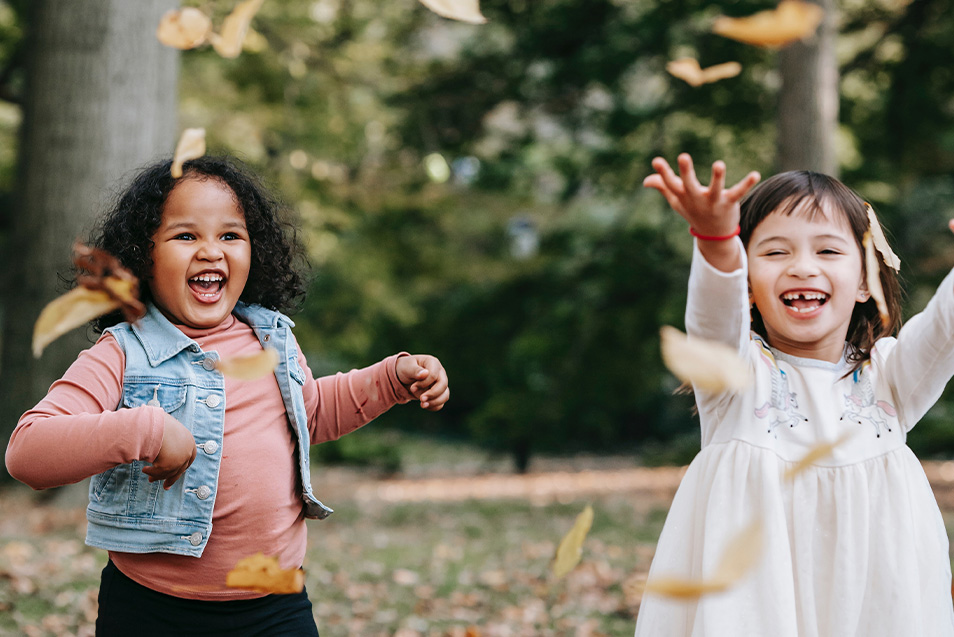So you know how we invest your sales tax dollars, we’re proud to put the spotlight on some of the many Jackson County organizations we fund.
Nature, an often overlooked aspect of mental, emotional and physical wellbeing, is the hallmark component of the ECOS program at Green Works in the urban core of Kansas City. Their motto, “No screen time, all green time!” helps to get students outdoors to learn about plants, insects and animals. Through their observations, nature has a profound, positive effect on their thoughts, emotions and social connections.
Environmental Connection Opportunities for Students (ECOS)
In 2007, Kate Corwin launched the first program, ECOS, that is now funded in large part by the Children’s Services Fund. A nature discovery course primarily for 4th through 7th grade students, Green Works hosts the program on Saturdays in fall and spring at Swope Park’s Lakeside Nature Center or the Kansas Children’s Discovery Center. The majority of their recruiting efforts have been focused on reaching kids and youth with the least amount of exposure to the outdoors and nature — children served by Kansas City Public Schools, and private and charter schools in the same area. Through the help of other partner organizations, they’re now able to transport children from the Northeast neighborhood of Kansas City to ECOS locations as well. It’s costly, but the rewards of helping kids feel seen, heard and valued by learning to feel comfortable in and around nature has lots of benefits. Students are able to process their thoughts and feelings and grow in a community surrounded by their peers and caring adults.
By getting kids outside, they gain new insights and experiences. ECOS activities that expose them to animals, plants and other natural elements include:
- Hiking trails and nature parks
- Observing the movement and habits of wildlife, insects, birds, fish and other animals
- Identifying native trees and plants
- Incorporating music and art
- Journaling about what they see, how they feel and their thoughts along the way
- Reading books about nature
“It’s really challenging to find something that Malaya feels passionately enough about to commit to year after year. You have found a way to communicate and relate to Malaya on a level that allows them to feel included, important and able to express themselves in a creative and safe environment. You have empowered Malaya to grow into their individuality and nurture their love for nature!” —Parent of 8th grader
The Benefits of Nature on Children’s Wellbeing
Recent studies by the Student Conservation Association are beginning to underscore the importance of outdoor activity. Children with maximized exposure to nature are happier, healthier, and smarter. On average, kids spend 44 hours per week on screen, but less than 10 minutes a day outside. But even a few minutes of outdoor playtime and movement has immediate and compounding benefits for young people.
Mental Calm, Emotional Wellbeing, Physical Health
Nature is busy. There are so many things and movements that can capture a child’s attention, that any aspect can stimulate and occupy their brains. The result is a natural calming effect that enables children to focus. Although some children are hesitant to initially engage with nature, once presented with the opportunity (and perhaps a bit of a nudge), they are quickly fascinated by the experience. They’re empowered to leave behind their fears — not just regarding nature, but life, relationships and mental struggles — and are free to enjoy learning with those around them.
Desiree Holt, the ECOS Program Director, gets to witness these transitions every spring and fall. “Kids are awed by the simple things. Nature is amazing, and it sparks conversations that help kids process their thoughts and feelings. They watch what’s happening in a stream or in the air, and feel a range of emotions from hesitancy to excitement. But they’re able to draw the connection back to their own lives.” Every experience evolves into a positive reaction and appreciation for nature — which is then connected to their mental health and wellbeing.
Kate understands that learning in nature helps kids in many ways:
- Overcoming adverse childhood experiences
- Improving relationship skills
- Reducing stress, anger and aggression
- Physical health through activity, eye movement near and far, and touching nature
- Increasing vitamin D levels from sun exposure
- Increasing brain activity, learning, and memory retention
Building a Community of Partnerships to Reach More Kids
Kate, the Greenworks staff, and their volunteers are thankful for the relationships they’ve built in the city with so many partner organizations who help to support their work.
- Kansas City Public Schools and Guadalupe Centers recommend students to attend ECOS.
- The Kansas City Parks and Recreation and the Missouri Department of Conservation help to maintain the natural areas kids can explore, observe, journal in and learn from.
- Local organizations that support children’s wellbeing such as Operation Breakthrough and Mattie Rhodes encourage kids toward ECOS also.
The CSF — A Key Partnership
As one of Green Works’ biggest funding contributors to the ECOS program, Kate has been able to leverage CSF’s “seal of approval” in order to obtain more funding for their work. “The community understands the rigorous process organizations must pass in order to obtain funding from the CSF. They know if the CSF has evaluated our work to support children’s mental health and wellbeing, then they can also have confidence that their contributions are supporting an effective program.”
Kate and Desiree are looking forward to spring registration and their upcoming program that will feature new and returning instructors, local urban farmers, and artists. They’re also excited about fostering leadership in returning students who can model healthy mental, social, and emotional skills for their peers.
Inspiring kids to love and care for nature while loving and caring for their own wellbeing is what Green Works’ ECOS is all about. Learn more about how you can apply for CSF funding and help Jackson County kids thrive!

